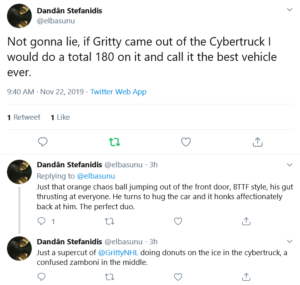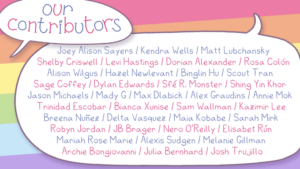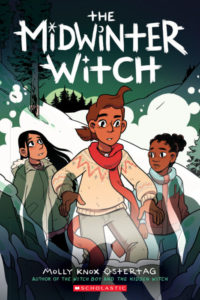
It’s not every day that an internet goofball who’s done or partnered up to create a half-dozen webcomics, a video comedy series, a scientific conference pastiche, a pair of choosable-path adventures, adaptations of great literature and religious doctrine, an AR-enhanced popular science overview and that thing with the monocles is going to spend more than two weeks at the top of the Amazon charts on immigration policy.
But we live in Davedamned interesting times, and Zach Weinersmith isn’t just any internet goofball. Nor is Bryan Caplan, who’s responsible for the words portion of the book in question, any professor of economics. He’s part of the economics faculty at George Mason University (which, along with the law program, is regarded as hostile to the notion of government, regulation, or acknowledgement that not everybody is equally advantaged to succeed in life), and associated with the Koch-influenced/funded Mercatus Center and Cato Institute¹.
They’re an unlikely pair (who happen to be fans of each other), and they’ve produced a book that does exactly what it sets out to — make a case for a policy position, argue for it, anticipate counter-arguments, and present reasons why the counter-arguments don’t hold water. With comics².
If you don’t feel like digging through another 2000 words, take that as the tl;dr.
This is going to be an unusual review for Fleen; I’m not warning about spoilers because it’s not that kind of book. I’m also going to virtually disregard the pictures part of this comic, because in this case the message is almost entirely divorced from the medium. The comics serve to make the economic argument to a different audience, and I can absolutely see Weinersmith’s influence in how Caplan’s points are paced and rendered accessible. In that sense the pictures are indispensable. But the artistic choices are not going to either make or break the economic argument, so this is going to be almost entirely about Caplan and not about Weinersmith.
Open Borders: The Science And Ethics Of Immigration is the first of the public policy offerings from :01 Books (and anticipating their coming civic society/engagement and history lines, marking a more academic direction for them, or at least moreso than the kid-aimed Science Comics and Maker Comics), a copy of which was kindly sent to me by Weinersmith.
It’s a compelling read, one that is going to grab the attention of anybody from any part of the political spectrum (as long as they don’t have an implacable bug up their butt about comics being beneath them; they exist, in all parts of said spectrum), and challenge assumptions held by nearly everybody regardless of how they feel about immigration. It reminds me a great deal of Larry Gonick’s work, in that it synthesizes a great deal of information (the notes and references are voluminous), presents it in an easily-considered format, and throws laugh-chuckles in as a bonus.
It’s left me about 85% convinced that Caplan is completely right, 10% convinced that he’s underselling some points and/or trying to have some things both ways, and 5% thinking he’s dodged a fundamental question or two. Let’s take them in order.
Caplan’s strongest argument is that, but for a poor choice of parents, many more people would both succeed in our society, and contribute enormously to the common good. It reminds me of Stephen Jay Gould’s famous declaration I am, somehow, less interested in the weight and convolutions of Einstein’s brain than in the near certainty that people of equal talent have lived and died in cotton fields and sweatshops.
As much as inequality within our society is a killer of human potential, Caplan rightly observes it applies to an even greater degree to the world at large — that a relatively small number of wealthy countries, by preventing a much larger number of people from poor countries from joining them in their societies, both perpetuates poverty and deprivation in the impoverished parts of the world, and deprives us all of the Shannons, Partons, and Curies that might have benefited all of humanity.
Along the way, he argues against the usual objections — it will cost too much, it will harm the standard of living in the rich countries, immigrants are a burden, they’re dangerous, only monoculture societies can thrive, it’s against my worldview or religion, only the most restrictive burdens can possibly moderate damaging side effects. It’s a conversational presentation, it’s convincing, it appeals on personal freedom grounds to those that prize that above all, and on ethical/humanitarian grounds to those of a parallel inclination.
The first area of concern that I have, the 10% worth, is with what Caplan calls Keyhole Solutions — tailoring immigration restrictions to be the narrowest possible interpretation instead of the broadest. For example, what if we counter the argument that immigrants will cost us too much (even though they won’t) by charging them large amounts of money to be redistributed to those already here, or preventing them from accessing benefits that they should qualify for as taxpayers. Caplan’s previously established that these fixes aren’t necessary, but he’s willing to go partway as a sop to the fearful or prejudiced, which strikes me as a bit unwilling to stand by his true convictions and beliefs.
Isn’t it better to let some people in and let them get somewhat economically exploited as opposed to not allowing them in at all? And if the alternative is zero immigration, there’s a certain logic there. But I think that allowing accommodations to those who are insisting that policies address what Caplan regards as untruths is an odd compromise to make.
And I think he’s not accounting for the degree that those who would be crafting these keyholes would invariably make them larger and more restrictive until we’ve taken what was supposed to be narrowly-tailored restrictions and made them maximally exploitative. Where on the spectrum from Nobody gets in to Everybody gets in with Some of you get in and we screw you for a while in the process in the middle do we find that the screwing is acceptable, and where it’s not?
We’ll let you in but we’ll haze you and it’s better than not letting you in at all isn’t a compelling argument if you’re talking about, say, an Ivy League secret society choosing which fourth-generation legacies to let in, and it’s positively repugnant when talking about people Caplan’s argued are systemically disadvantaged and exploited by not being able to come here freely. I also think that such a system would work to undermine the historically thorough assimilation process that he rightly observes elsewhere.
Right now, to my eye (and I’ll immediately state that I haven’t studied this in anything resembling the depth that Dr Caplan has; it’s purely based on my personal observation growing up in a part of the country that had multiple, successive and overlapping waves of immigration from different parts of the world), immigrants to the US regard the viciously ridiculous process of getting permanent residence and/or naturalizing as bureaucratic, expensive, complicated, stupid, and sometimes Kafkaesque, but not actively malicious. The Keyhole Solutions have the potential to upend that belief.
Not to mention that for somebody who lets his general distrust and disbelief in government involvement in life — taxation, spending, and regulation — occasionally come out to play in Open Borders, Caplan seems curiously willing to let that happen to immigrants under these Keyhole Solutions for the benefit of those already here. I’m just not sure how somebody whose body of work has such deep skepticism about the ability of government to act competently can muster the belief that government can find a way to responsibly haze newcomers and make them feel thankful for the trouble. There may well be a needle that can be threaded, a keyhole narrowly cut, but it still smacks of capitulation to those that Caplan’s arguing against.
The more serious concerns I have are with some assumptions Caplan makes that are fundamental to his thesis — and not directly related to immigration and so not addressed. Open immigration will be a net win for everybody, he argues. It will increase the wealth generation of the world by 50% to 150%. Trillions of dollars of economic growth otherwise missed out on! The usual arguments against these positions come down to There’s no room!, which is plain nonsense, but Caplan takes the time to counter them anyway. Full marks there.
But he comes from an economic school that assumes productivity can keep growing, and more stuff can be made more cheaply, forever. And on a planet with diminishing resources (particularly water) and accelerating climate change, that’s not true. There’s no acknowledgment of what negative outcomes may result from unrestricted growth, nor of the fact that increasing productivity has for decades now come from squeezing the labor force and not sharing the additional wealth generated. Every increase in productivity has been accompanied by a stagnation or reduction of real wages in the American workforce, a shifting of money to higher economic bands, and reductions in skilled labor.
Caplan’s argument that everybody net wins is based on the idea that somebody from a terribly poor country will come to the global north and still be poor, but in a richer place and therefore better off in absolute terms. Those in the rich countries that have already been displaced by productivity gains will, he assumes, move up into more skilled and privileged positions.
But the past four decades have shown us that hasn’t happened and isn’t likely to without extensive spending/taxation/regulatory changes, something that Caplan doesn’t favor. The corporate state absolutely will not share its wealth broadly without redistributive policies, with or without open (or open-ish) immigration. Without addressing the hollowing of the American workforce and the gigification of the economy, the rosy predictions that modern capitalism can continue to produce and grow³ out of whatever difficulties we have now or in the future are not something I want to base predictions on.
Caplan’s convinced me that there’s no rational argument for immigration policies that favor immigration rather than restrict it, open to the point that we probably let in almost anybody. I like the thought of being able to say, Hey, you murdered a bunch of people/have a history of bribery and tax avoidance/despoiled land that didn’t belong to you/stole from your fellow citizens from a position of trust, you don’t get to come here, but saying Only professional-class Norwegians can come, you’re too brown/poor to be allowed in needs to go by the wayside. I may even be convinced that it’s possible to craft keyholes that won’t immediately be gamed for the purpose of inflicting pain on the vulnerable for the benefit of the powerful.
I think there may also be arguments about the development of new technologies or solutions to the problems of infinite consumption, and I think that getting people to where they can fully act on their abilities is a good in and of itself, even if we don’t make the global economy enormously larger. Caplan doesn’t address them, and I’d like to see him do so. He’s given a distinct impression that unrestricted immigration is an intrinsic, ethical good and I believe that he believes that.
I just wish that he didn’t feel the need to tie it to a set of economic assumptions that are not sustainable as they are — much less if you kick them into higher gear — without intervention to offset their negative effects.
None of which is to say that it’s not worth reading this book. Caplan and Weinersmith set out to have a conversation, start a discussion, and shift the Overton window away from Immigrants will eat your children and towards Oh for Dave’s sake, don’t be an innumerate, racist jerk towards your fellow humans. They’ve succeeded at that, and they’re going to have me digging into the notes and resources for some time to come. Besides, any book that features a dozen babies angrily berating Nobel laureate Milton Friedman is always worth at least one read.
Open Borders is available where you get books.
Spam of the day:
My friend Alex Allman has posted a video revealing 3 simple tips that actually trigger an ADDICTION-like response in women so that her body and mind will literally become OBSESSED with YOU.
Treat her like a human being with agency and not some videogame boss battle that has a cheat code?
_______________
¹ I think I’m sufficiently on record that I think the kind of libertarianism espoused by the Koch Brothers and those they favor is premised on the core philosophy of Fuck You, I Got Mine, dressed up by people who aren’t sufficiently without shame to just admit that part out loud.
² Because comics are never the work of just one person, I’ll note that Mary Cagle is credited on the title page as colorist, and she’s done her usual bang-up job (assisted by Lindsey Little, Edriel Fimbres, and Polyna Kim). Rachel Stark and Calista Brill provided editing, and given the technical, persuasive, and potentially controversial nature of the book, I’d say they probably contributed more than the usual degree.
³ Given how much of the productivity gains requires shipping manufacturing to low-regulatory countries with cheap labor, what happens if Caplan’s global raising up happens? WalMart sells stuff for five bucks and makes three-fifty in profit because they can offload the manufacture to desperately poor countries.
Caplan’s stated goal is to erase that differential between wealthy and desperately poor, so where will the stuff be made? How do we avoid the race to the bottom that we already find with respect to everything from polluting industries to promises of job creation that leads states and municipalities to fall over themselves to offer more freebies and bigger tax exemptions?
Given that one of Caplan’s very first arguments is that the global poor are disadvantaged by not being allowed to sell their labor here (and he repeatedly acknowledges that most who come here under his model will be low-skilled), it looks like something his plans count on rather than avoid. Working for an arm’s-length contract supplier under miserable conditions in an Amazon fulfillment hellhole may be better than the conditions they left, but it’s still objectively bad and not something we should want for anybody.








